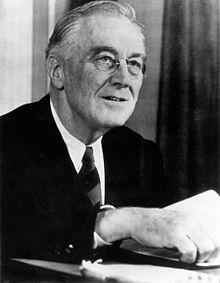
The Arsenal of Democracy is one of the most famous of 30 fireside chats broadcast on the radio by United States President Franklin Delano Roosevelt. It was read on December 29, 1940, at a time when Germany had conquered most of Europe, threatened Britain, and was allied with Italy, Japan and the Soviet Union.
The speech was a "a call to arm and support" both Europe and to a lesser extent Asia's powers in their respective struggles against the fascist regimes. At the time it was broadcast Roosevelt assumed the Axis powers of Germany, Italy and Japan were collaborating closely in their successful wars in Europe and Asia. The term "arsenal of democracy" was contributed by Harry Hopkins, Roosevelt's top advisor.
In terms of leadership, the speech has been interpreted as the "next step" in a several stage process in awakening a somnolent, inward-looking country that had been isolationist for the preceding two decades. While the United States Navy seemed strong and was widely perceived to guarantee the Western Hemisphere safe from Axis aggressions– the United States Army numbered barely two hundred and fifty thousand soldiers
Synopsis
Much of the opening of the speech attempted to remove any sense of complacency. Roosevelt laid out the situation clearly, and then pointed out the flaws in that argument. He mentioned that "Some of us like to believe that even if Great Britain falls, we are still safe, because of the broad expanse of the Atlantic and of the Pacific." He refuted that argument, claiming that technology had effectively reduced the distances across those oceans. Technology of the era had indeed allowed for "planes that could fly from the British Isles to New England and back again without refueling."
After establishing the danger, the president then proceeded to request action from the people. He acknowledged a telegram he had received. He refuted its message, which he summarized as "Please, Mr. President, don't frighten us by telling us the facts." The central fact Americans must grasp was, "If Great Britain goes down, the Axis powers will control the continents of Europe, Asia, Africa, Australia, and the high seas -- and they will be in a position to bring enormous military and naval resources against this hemisphere."
He then continued to describe the situation in Europe, all the while punctuating his remarks with warnings how the Nazis would use the same tactics in the Western Hemisphere, and giving vivid imagery such as "The fate of these nations [occupied by force by the Nazis] tells us what it means to live at the point of a Nazi gun."
Roosevelt attacked the British prewar policy of appeasement, calling it ineffective. Listing prior examples given by European countries, he made the futility of the policy clear.
The only solution was to help Britain, "the spearhead of resistance to world conquest", in particular—while those allies were still around. While not explicitly promising to stay out of the fighting , he argued "our national policy is not directed toward war"--indeed he said helping Britain now would save Americans from having to fight. "You can, therefore, nail -- nail any talk about sending armies to Europe as deliberate untruth." Europe does "not ask us to do their fighting. They ask us for the implements of war, the planes, the tanks, the guns, the freighters which will enable them to fight for their liberty and for our security. Emphatically we must get these weapons to them, get them to them in sufficient volume and quickly enough, so that we and our children will be saved the agony and suffering of war which others have had to endure."
He urged this to change, all the while stressing that open war would not hurt the country: "the strength of this nation shall not be diluted by the failure of the Government to protect the economic well-being of its citizens." He focused on that theme of "splendid cooperation between the Government and industry and labor" for several paragraphs, citing how American labor will make an impact in the combat zones, and how important the manufacture of weapons and vehicles is to being strong as a nation.
He warned against labor strikes, probably having in mind the strikes in munitions plants deliberately instigated by Communists. (At the time the Soviet Union was allied with Hitler.) "The nation expects our defense industries to continue operation without interruption by strikes or lockouts. it expects and insists that management and workers will reconcile their differences by voluntary or legal means."
Roosevelt stressed that it was not the American government but the American people who had the power to turn the tide of the war. It is here that he uses the phrase "arsenal of democracy": "We must be the great arsenal of democracy. For us this is an emergency as serious as war itself. We must apply ourselves to our task with the same resolution, the same sense of urgency, the same spirit of patriotism and sacrifice as we would show were we at war." Finally he reassures the American people: "I believe that the Axis powers are not going to win this war."
References
- David M. Kennedy. Freedom from Fear: The American People in Depression and War, 1929-1945 1999. pp 468-9.
- Complete Text of speech